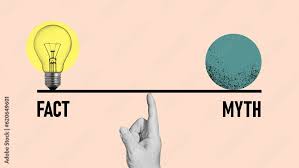We’ve all fallen victim to this: hearing a “fact” once and believing it to be the whole truth without question—until the moment you discover it’s not a fact at all, but the complete opposite. In other words, your brain has been catfished over and over again. Whether you heard it from your parents when you were a toddler or from a stranger on the internet, there are likely hundreds, even thousands, of common misconceptions out there, covering everything from goldfish memories to sugar making children hyperactive. Here, I’ll debunk 10 less obvious myths you probably still think are true—from missing person reports to trickle-down economics and the “five” senses.
We only have five senses.
Have you heard of the “sixth sense”? The answer is probably yes—and you do have it. But you also have a seventh, an eighth, a ninth, and more. Scientists are still figuring out just how many. There are the five we commonly think of—taste, smell, sight, hearing, and touch. But these are only the basics taught in childhood. In reality, we also have senses such as equilibrioception (balance), proprioception (body awareness), thermoception (temperature), and nociception (pain).
Breakfast is the most important meal of the day.
This statement has probably been repeated to you since childhood by parents and teachers, but it isn’t exactly true. The idea that breakfast is uniquely important can be traced back to the mid-19th century, but the specific slogan we hear today actually came from 1940s cereal company marketing campaigns. My dad loved to tell me this was the “biggest lie” back when he did intermittent fasting, lost weight healthily, and still skipped breakfast. Sure, breakfast is important—but so is every other meal, and everyone’s needs are different. The real key is getting your nutrients throughout the day.
You have to wait 24 hours to report someone missing.
That “24-hour rule” you’ve seen in crime shows? It’s fake. If someone you know goes missing and you think they may be in danger, you can—and should—report it immediately. Waiting an entire day just because you saw your favorite TV character do it could waste critical time.
You burn fat by working out.
You do lose fat through exercise, but you’re not literally “melting it off” or burning it, as the saying suggests. Most fat actually leaves your body as carbon dioxide, while the rest is converted into water or energy. Yes, this means you’re breathing most of it out! So next time you’re at the gym, think more about exhaling than sweating.
You’re either left-brained or right-brained.
The idea that each person has a dominant side of the brain is a misconception. It’s true that the left hemisphere handles more logical tasks such as reading and processing language, while the right is associated with creativity and intuition. But no one side dominates; both hemispheres work together in everything you do.
Lie detector tests actually detect lies.
Those celebrity YouTube videos where interviewers try to stir up gossip by “exposing” lies? Take them with a grain of salt. Polygraphs, or “lie detectors,” don’t actually detect lies—they measure physical responses like sweating or a racing heart, which can happen for many reasons (including drinking coffee). This is why lie detectors are essentially useless in court—they’re pseudoscience at best.
Vaccines cause autism.
This myth—still circulating today—is exactly that: a myth. It originated from a 1998 study later discredited and exposed as outright fraud. Countless studies since have shown no link between vaccines and autism, which is primarily genetic in cause. This dangerous lie has unfortunately regained traction in recent years, despite overwhelming scientific evidence against it.
It’s illegal to have the car’s interior light on while driving.
My parents told me this when I was little and tried to read in the car—and I believed it. But while no law prohibits it, you still shouldn’t do it. The myth comes from reasonable concerns: it’s distracting and potentially dangerous for the driver. So no, a cop won’t pull you over for it, but it’s best to leave the light off unless necessary.
Lowering taxes for rich people helps wealth “trickle down” to the lower classes.
This idea, popularized in the 1980s, sounds nice in theory—but in practice? Not so much. Decades of research show that cutting taxes for the wealthy doesn’t benefit the average middle-class citizen. The wealth tends to stay at the top, while inequality worsens. Personally, I think the rich can afford to chip in a little more and help the rest of us.
Extroverts are loud and outgoing, and introverts are quiet and reserved.
Extroversion and introversion aren’t about personality traits—they’re about where you get your energy. Extroverts recharge by being around others, while introverts recharge by spending time alone. But that doesn’t mean introverts can’t be outgoing or extroverts can’t enjoy solitude. It’s all about how you reset.
How many of these myths did you believe? It’s okay—we’ve all been fooled by common misconceptions, myself included. Now that you know how many of these “facts” are really myths, your brain will be harder to catfish next time. This is why critical thinking matters: it teaches you to question what you’d normally accept without a second thought.
Sources:
https://www.weforum.org/stories/2017/01/humans-have-more-than-5-senses/
https://marketingmadeclear.com/kelloggs-marketing-lie/
https://www.missingpersonsresearchhub.com/post/quashing-some-myths-about-missing-persons
https://www.medicalnewstoday.com/articles/287046#Eat-less-move-more
https://journals.plos.org/plosone/article?id=10.1371/journal.pone.0071275
https://www.psychologytoday.com/us/blog/memory-detection/201910/the-lie-detection-myth
https://pmc.ncbi.nlm.nih.gov/articles/PMC3136032/https://pmc.ncbi.nlm.nih.gov/articles/PMC3136032/
https://www.driving.org/dispelling-the-myth-is-it-illegal-to-drive-with-interior-car-lights-on/
https://www.tjguttormsen.com/blog/what-does-introvert-and-extrovert-really-mean

























